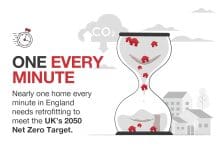Despite announcements committing millions of pounds to green jobs initiatives, the government is yet to define what a ‘green job’ is, says the Environmental Audit Committee
Inconsistent Government policy on green jobs and a knowledge-gap in necessary skills are causing missed opportunities, warns the Environmental Audit Committee.
In its latest report, ‘Green Jobs’, the committee expresses disappointment that the government is yet to define what a ‘green job’ is, and how it will evaluate the perceived demand.
The Net Zero Strategy, which claims to support up to 440,000 jobs by 2030, would have been the ideal opportunity to offer clarity on how to define and measure what ‘green jobs’ are, says the EAC. While the strategy set out the government’s green jobs and skills ambitions, what is needed now is a detailed, actionable delivery plan.
Delay in clarifying this information could lead to the government’s ambitions amounting to an aspiration and failing to prepare the UK for the future. This lack of understanding was apparent in the Green Homes Grant voucher scheme, where the government failed to engage with the sector to develop the skills required, resulting perversely in contractors making staff redundant as consumers awaited confirmation of vouchers.
During the inquiry, the committee heard that climate change and sustainability risked being seen as a ‘tick box exercise’ in education. It is imperative that current and future workforces are both climate and sustainability literate – criteria that must run through all education and training. To achieve this, the committee recommends that environmental sustainability be embedded across all National Curriculum and A Level courses, and a module on sustainability included in every apprenticeship and T Level course.
Some of the committee’s recommendations include:
- The government should set out its definition of ‘green jobs’, and how it will measure the number, type and location of these over the 2020s, for the purpose of monitoring and evaluating the impact of its policies.
- By the end of 2021, the government department or body with overall responsibility for delivery of the government’s green jobs policies should assign indicative costings to each department’s actions within the overall green jobs delivery plan.
- The government’s net zero and environmental goals must be considered at the design stage of future labour market interventions, to ensure they align with the green recovery.
- The government should pilot a National Nature Service during 2022.
- The government’s own analysis into the Green Homes Grant voucher scheme must be completed this year to take learnings to inform future schemes’ designs, and include a plan for industry engagement, to rebuild trust.
- By the end of this year, the government needs to set out a programme to encourage development of relevant skills across the construction trade, including small and medium-sized enterprises, to stimulate development of skilled trades to increase the capacity markedly.
- A just transition plan should be published by the end of this year and assess regional as well as sectoral impact.
- Environmental sustainability must be included across all primary and secondary courses delivered through the National Curriculum and across A Level courses. Teachers should be supported to deliver this, with teacher training and continuous professional development.
- A module on environmental sustainability should be included in every apprenticeship and T Level course.
- The government should set out its ambitions for improving diversity and inclusion in the green workforce and set out how it will measure diversity and inclusion in green jobs.
- The government should set out how it will adapt its Careers Strategy to align with its net zero and environmental goals, including how it will reach different groups of the population to increase awareness of green job opportunities and how to access them.
‘Building an economy set for net zero’
Environmental Audit Committee chairman, Philip Dunne, said: “From renewable energy clusters in the North East and Scotland, to engineering powerhouses in the Midlands and nature conservation in the South West, we are building an economy set for net zero.
“But the workforce of the future is being undermined by a lack of evidence-based Government policies on how jobs will be filled in green sectors.
“Encouraging announcements of investment in green sectors of the economy are very welcome but the government admits that claims about green jobs lack explanation and data on how the targets will be achieved.
“Our report today sets out how these green jobs roles can be filled. Monitoring the sectors and regions where the jobs are needed, and rebooting careers advice that demystifies green jobs, is critical if we are to meet our environmental goals.”














